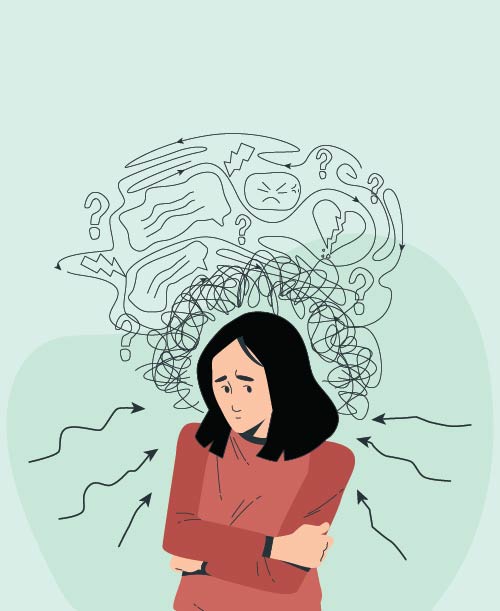

Difference Between Hallucination and Delusion
Mental health plays a vital role in our overall well-being, yet it’s often misunderstood. Millions of people worldwide experience mental health conditions, and recognising the symptoms early can make a big difference. Among the more complex symptoms are hallucinations and delusions—often confused but very different. Hallucinations involve sensing things that aren’t there, while delusions are false, fixed beliefs. Both can seriously impact a person’s life. Understanding the difference is key to offering support and reducing stigma.
Difference between Hallucination and Delusion
It is very important to have a distinction between the two phenomenon. One of the many reasons for that is that they can be connected to major illnesses. Regardless, it would be wise to stay protected against any illness or injury through a health insurance plan. Here are some key difference between hallucination and delusion:
1. How They Affect
Both symptoms can deeply impact a person’s life, relationships, and sense of safety.
• Hallucinations may cause fear, confusion, or isolation if the person can’t tell what’s real.
• Delusions can lead to mistrust of others, risky behaviour, or withdrawal from social life.
2. Types
Types of Hallucinations:
a. Auditory
Hearing voices or sounds that aren’t there (most common)
b. Visual
Seeing people, objects, or lights that aren’t real
c. Tactile
Feeling things on or under the skin (like bugs crawling)
d. Olfactory
Smelling odours that have no physical source
e. Gustatory
Tasting things without any food present
Types of Delusions:
a. Paranoid
Believing others are plotting against them
b. Grandiose
Believing they have special powers or fame
c. Somatic
Believing something is wrong with their body
d. Erotomanic
Believing someone is in love with them
e. Jealous
Believing their partner is unfaithful without reason
3. Causes
Often arise from:
a. Psychiatric conditions
Schizophrenia, bipolar disorder, severe depression
b. Neurological or medical issues
Brain injury, dementia, sleep deprivation
c. Substances
Drugs, alcohol, withdrawal
4. Symptoms
A. Hallucinations may include:
• Hearing voices or music others don’t hear
• Seeing people or lights that aren’t present
• Feeling a touch or crawling sensation with no cause
B. Delusions may include:
• Unshakable beliefs that don’t match reality
• Extreme suspicion or paranoia
• Misinterpreting ordinary events as highly significant
5. Treatment
As tricky as these conditions may be, treatments exist for them. These treatments can be availed through cashless health insurance at any network hospital of your choice. Treatment often depends on the cause, but may include:
a. Medication
Antipsychotics are commonly used to reduce both hallucinations and delusions.
b. Therapy
Cognitive Behavioural Therapy (CBT) helps people challenge untrue thoughts and cope with symptoms.
c. Support systems
Family support, peer groups, and psychoeducation help improve understanding and reduce stigma.
d. Hospital care
In severe cases, short-term hospitalisation may be needed for safety and stabilisation.
Conclusion:
Understanding the difference between hallucinations and delusions is key to recognising serious mental health conditions early. While both symptoms can be distressing, timely treatment and the right support can make a significant difference in recovery. Mental health care often requires ongoing medical attention, therapy, and medications—all of which can become costly over time. That’s why having a health insurance plan that covers mental health services is not just helpful, but essential for long-term well-being and peace of mind.
Sources: healthline, verywellmind, nimh.nih.gov, pmc.ncbi.nlm.nih.gov, who.int
Disclaimer: This blog provides general information and discussions about health and related subjects. The information and other content provided in this blog, website or in any linked materials are not intended and should not be considered, or used as a substitute for, medical advice, diagnosis or treatment. Kindly contact your Doctor before starting a new medicine or health regime.
Related Articles
Schizophrenia – Everything You Should Know
What are the different types of schizophrenia?
Early Signs of Mental Health Issues and How to Get Help
Published on July 28, 2025














 Health Insurance
Health Insurance  Travel Insurance
Travel Insurance  Car Insurance
Car Insurance  Cyber Insurance
Cyber Insurance  Critical Illness Insurance
Critical Illness Insurance
 Pet Insurance
Pet Insurance
 Bike/Two Wheeler Insurance
Bike/Two Wheeler Insurance  Home Insurance
Home Insurance  Third Party Vehicle Ins.
Third Party Vehicle Ins.  Tractor Insurance
Tractor Insurance  Goods Carrying Vehicle Ins.
Goods Carrying Vehicle Ins.  Passenger Carrying Vehicle Ins.
Passenger Carrying Vehicle Ins.  Compulsory Personal Accident Insurance
Compulsory Personal Accident Insurance  Travel Insurance
Travel Insurance  Rural
Rural